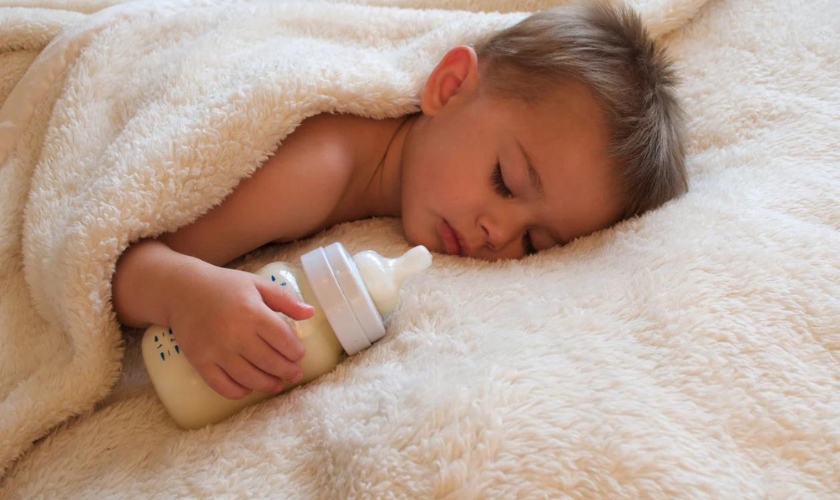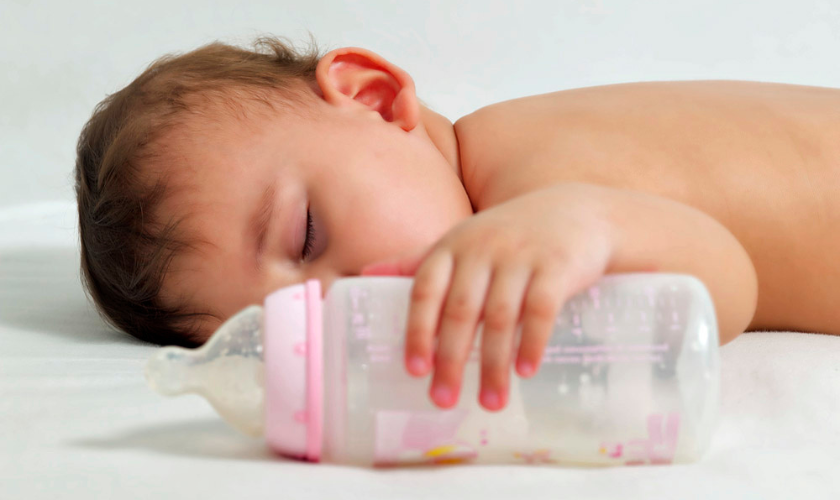
April 2, 2024
Sleep Apnea
For many parents, bottle-feeding offers a convenient and effective way to nourish their babies. However, concerns often arise regarding its potential impact on sleep. While bottle-feeding itself isn’t inherently detrimental to sleep, certain practices associated with it can contribute to sleep disruptions.
Let’s delve deeper into this topic, exploring the potential connections and practical solutions to ensure your child gets the restful sleep they need.
Understanding Sleep Associations
Newborns have immature sleep-wake cycles, and they rely on external cues to fall asleep and stay asleep. These cues, known as sleep associations, can be anything from rocking to swaddling to sucking on a bottle. While these associations can be helpful initially, they can become problematic if your child depends on them exclusively to fall asleep.

When bottle-feeding becomes a sleep association, your child might expect the bottle every time they need to drift off. This can lead to frequent night wakings and difficulty self-settling, causing frustration for both you and your little one.
Sleep Apnea and Bottle Feeding Practices: How Are They Related?
There’s a potential link between bottle feeding and an increased risk of sleep apnea, particularly obstructive sleep apnea (OSA) in children. Here’s how:
Facial development
Breastfeeding promotes facial development by encouraging proper tongue movement and positioning. This can help shape the jaw and palate, leading to a wider airway. Bottle feeding, on the other hand, might not stimulate the same muscle development, potentially contributing to a narrower airway.
Tongue posture
Sucking techniques differ between breast and bottle. Breastfeeding allows for a more forward tongue position, which keeps the airway open. Bottle sucking can lead to a more backward tongue posture, potentially obstructing the airway during sleep.
It’s important to note that the research isn’t conclusive. Some studies show a connection, while others don’t. Here are some additional factors:
- Duration of breastfeeding: Studies suggest that longer breastfeeding duration might offer a greater protective effect against sleep apnea.
- Genetics: Facial structure and predisposition to sleep apnea can also play a role.
How Bottle-Feeding Practices Can Affect Sleep
Bottle feeding offers flexibility and convenience for parents, but certain practices can unintentionally disrupt a baby’s sleep.
Here’s a closer look at how some common bottle-feeding habits might contribute to sleep issues:
Bottle-Feeding at Bedtime
- Creates Sleep Associations: If a consistent routine involves a bottle right before bed, your child might learn to associate the bottle itself with sleep. This can make it difficult for them to fall asleep independently without the bottle as a crutch.
- Disrupts Sleep Cycles: Feeding wakes your baby up to some degree, even if they drift off while feeding. This disrupts the natural progression of sleep cycles, leading to fragmented sleep and frequent waking later in the night.
Sleep Feeding
- Dependence on Feeding for Comfort: Offering a bottle as a quick soother might seem like a solution at the moment, but it reinforces the idea that feeding equals comfort. This can create a dependence on the bottle to fall back asleep, leading to more night wakings when the bottle isn’t readily available.
- Reduced Self-Soothing Skills: Babies who are constantly soothed with feeding don’t have the chance to develop their self-soothing skills, which are crucial for helping them fall asleep independently and stay asleep through the night.
Overfeeding
- Discomfort and Fussiness: Unlike breastfeeding, in which babies can regulate their intake, bottle-feeding allows for easier overfeeding. A full stomach can cause discomfort, gas, and even reflux, leading to fussiness and waking during the night.
- Disrupted Sleep Patterns: Overfeeding throws off hunger cues and sleep patterns. A baby who is used to a larger bedtime bottle might wake up earlier than usual feeling hungry, disrupting their established sleep schedule.
Additional Factors to Consider
Beyond the typical bedtime battles, several other factors can disrupt your child’s sleep. Here’s a more detailed look at some common culprits:
- Teething Discomfort: For little ones, those new pearly whites can be a literal pain. The irritation and inflammation in the gums can make it hard to fall asleep and stay comfortable through the night.
- Developmental Milestones: During periods of rapid growth and learning, like learning to walk or talk, a child’s sleep patterns might become temporarily disrupted. They may be more easily startled awake by new experiences and excited to practice their newfound skills, even at night.
- Medical Conditions: Certain medical conditions, including allergies, asthma, ear infections, or even chronic pain, can cause discomfort and make sleep difficult.
- Psychological Issues: Anxiety, depression, and even nightmares can significantly impact sleep quality in children. Stressful events at home or school can also contribute to sleep disturbances.
- Environmental Factors: An uncomfortable sleep environment (too hot, too cold, too bright, or noisy) can make it challenging to fall asleep and stay asleep. Inconsistent sleep schedules, exposure to screens before bed (due to the blue light emission that suppresses melatonin production), and caffeine intake can also disrupt sleep patterns.
- Family Sleep Habits: Inconsistent bedtime routines, co-sleeping (especially if disruptive), and parental anxieties about sleep can all influence a child’s sleep habits.
Promoting Restful Sleep with Bottle-Feeding
Ensuring your little one gets a good night’s sleep is crucial for their health and development. While bottle-feeding offers flexibility, it can sometimes become intertwined with sleep routines.
Here are some tips to establish healthy sleep habits and promote restful nights for both you and your baby:
Create a Clear Separation Between Feeding and Sleep
- Plan Feeding Times Strategically: Aim to offer the last bottle feeding 30-60 minutes before bedtime. This allows enough time for digestion and avoids associating feeding directly with falling asleep.
- Focus on Comfort, Not Calories: During the bedtime routine, prioritize calming activities such as overfeeding. A warm bath, gentle massage, or singing lullabies can signal the transition to sleep.
Develop a Relaxing Bedtime Routine
- Establish Consistent Timing: Put your baby down drowsy but awake at roughly the same time each night. This helps regulate their natural sleep-wake cycle.
- Soothing Activities: Create a calming pre-sleep ritual that doesn’t involve feeding. This could include dimming the lights, rocking, singing lullabies, or reading a quiet story. Consistency is key, so repeat these steps each night to signal to your baby that it’s time to wind down.
- Dim the Lights: Melatonin, a sleep hormone, is produced in response to darkness. Dimming the lights 30 minutes before bedtime helps prepare your baby’s body for sleep.
Offer Comfort and Reassurance Before Rushing to Feed
When your baby wakes at night, try calming them with soothing words, gentle rocking, or patting before offering a bottle. This teaches them self-soothing skills and helps break the association of feeding with falling asleep.
Respond Gradually and Consistently
- Develop Patience: If your baby does wake and cry for a bottle, allow a few moments before responding. Sometimes, they might fuss or cry briefly before settling back to sleep independently. This graduated approach helps them learn to self-soothe.
- Stick to the Routine: Consistency is key! Even during teething times, growth spurts, or periods of illness, try your best to maintain the established sleep routine. This provides a sense of security and predictability for your baby.
Bottle feeding itself doesn’t have to be a barrier to good sleep for your child. So, you need to be mindful of sleep associations and make adjustments to your routine. By doing this, you can create a sleep-conducive environment that allows your little one to drift off peacefully and sleep soundly.
Remember, every child is unique, and what works for one might not work for another. If you’re facing significant challenges, feel free to seek guidance from a sleep consultant or pediatrician who can offer personalized advice.
With patience, consistency, and the right approach, you can ensure your bottle-fed baby enjoys restful nights, which allows you to do the same!
Recent Posts

Whitening for Seniors: Safe Ways to Restore Youthful Brightness

Veneers for a Whiter Smile: How Ceramic Shells Outperform Whitening Treatments

How Dr. Jay Uses Platelet‑Rich Plasma in Periodontal Care

The Secret to Zero Cavities: Maximizing the Preventive Power of Your “Use-It-or-Lose-It Policy Benefits

